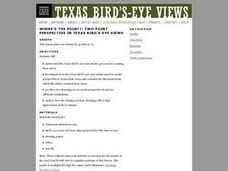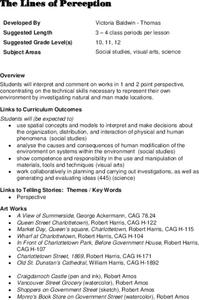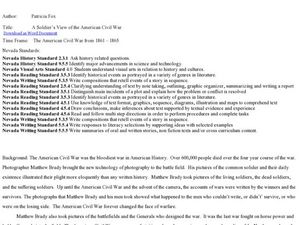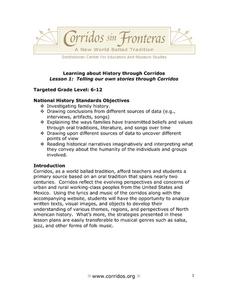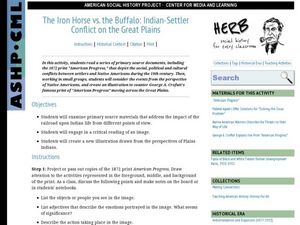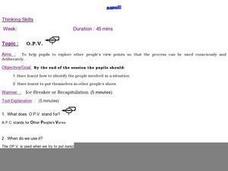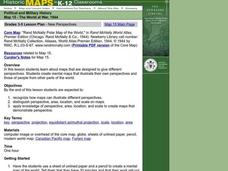Ford's Theatre
How Perspective Shapes Understanding of History
The Boston Massacre may be an iconic event in American history, but perhaps the British soldiers had another point of view. Using primary sources, including reports from Boston newspapers and secondary sources from the British...
Curated OER
Where's the Point?: Two-Point Perspective in Texas Bird's-Eye Views
Learners investigate how the Texas bird's-eye-view artists used two-point perspective to create their aerial views and consider the directions from which the artists oriented their views. They produce two drawings in tow-point perspective.
Curated OER
Point of View
A picture is used to begin considering point of view. Then, have kids role play included scenes which all involve some type of conflict where the character's have very different perspective. Discussions ensue each role play, with kids...
Curated OER
The Lines of Perception
Young scholars interpret and comment on works in 1 and 2 point perspective. They locate the focal point of works done in 1 point perspective and create a drawing of a street or landscape in their local area using 1 point perspective.
Curated OER
Lesson: Storyboarding Revolution
Kids consider revolution as a basis for creativity, art, and storytelling. After reading an excerpt from the book, Persepolis, learners choose one event from any world revolution to write about. They storyboard the event focusing on...
Curated OER
The assassination of the Archduke: Exploring Perspectives
Use political cartoons for a multiple-perspectives strategy, as pupils learn about the assassination of Archduke Franz Ferdinand. After an anticipatory discussion, they are split into 2 groups. The class reads a primary source account...
Curated OER
Perceptions
Students gain a better understanding of perceptions and how different points of view about the same set of events leads to conflict.
Curated OER
Lessons in Looking: Contraband in Paintings
Using the paintings On to Liberty and A Ride for Liberty, 10th graders analyze historical perspectives on life after the Civil War. They attempt to determine what the Civil War meant for free slaves, then read a paragraph highlighting...
Curated OER
One Room School House Reading Lesson
Learners explore schools during the Colonial period. In this American history lesson, students participate in a simulation of school days in Colonial America. Learners visit a museum and use the schoolhouse as a setting for their...
Curated OER
A Soldier's View of the American Civil War
Study and research the American Civil War in this explanatory writing lesson. Middle schoolers complete six activities to learn about the American Civil War and soldiers' views of the war. The lesson includes several options to complete...
Curated OER
Call It a Hunch
Give young scholars a chance to practice making inferences after reading the book Through My Eyes by Ruby Bridges. They confirm whether or not their conclusions are true, have a class discussion, and then independently complete an...
National History Day
“War Is Hell. We Know it Now.” American Soldiers in the Meuse-Argonne Offensive
Understanding the soldier's experiences during World War I sometimes takes a newscast. Learners see the importance of understanding multiple points of view with a newscast project surrounding the Meuse-Argonne Offensive. Compare and...
Curated OER
Historical Fiction: A Wealth of Interpretations
Students read a book from the Dear America series and contrast different points of view. They respond to the book either by participating in a literature circle or completing a journal entry. They compare and contrast two books or a...
Curated OER
A View from the Ground
Students look at a park from ground perspective. In this map skills lesson, students are introduced to a story about a girl at a park and make observations about the park based on a picture. This prepares students for the next lesson in...
John F. Kennedy Presidential Library & Museum
Analyzing the Inaugural Address
Get high school historians to step outside their own shoes by responding to JFK's inaugural address from the perspective of a civil rights activist, a soviet diplomat, or a Cuban exile. After a class discussion about the address,...
Channel Islands Film
Eminent Domain
After viewing the documentary The Last Roundup, a documentary about the transitioning of Santa Rosa from a privately own island to a National Park, class members debate the takings clause of the Fifth Amendment that permits the...
Curated OER
Passing Down Family History Through Oral Tradition: Corridos
Learners create and perform Corridos which are oral tradition ballads. In this Passing Down Family History Through Oral Tradition lesson plan, students interview family members using a predetermined list of questions. In addition,...
Curated OER
Four Armed Men From the Renaissance!
Students study the Renaissance and the important art from the period. In this Renaissance lesson, students discuss the black plague and religion during the Renaissance. Students read the Renaissance worksheet and learn vocabulary words...
Curated OER
The Iron Horse vs. the Buffalo: Indian-Settler Conflict on the Great Plains
The Iron Horse encroached upon the land while conflicts escalated between Native Americans and the settlers. Sophomores study the print, American Progress then discuss how American progress affected Native Americans. They will study the...
Curated OER
Past, Present and Future Through the Eyes of Long Jakes
Even the littlest learners can become art historians if they have the right training. For the lesson, your preschoolers discuss the piece Long Jakes as they point out all the details they notice. They discuss what mountains and mountain...
Curated OER
Tools of the Historian: Frame of Reference
Students discuss the term point of reference and describe their own point of view. They compare the relationship between sources and the historical context. They identify examples of how point of reference can affect one's interpretation.
Curated OER
O.P.V. (Other People's Views)
Pupils explore other people's view points so that the process can be used consciously and deliberately. They identify the people involved in a situation. Students put themselves in other people's shoes.
Curated OER
Talking Heads
Young scholars create an imaginary conversation. In this perseverance lesson, students complete a t-chart about words that describe perseverance and words that describe the opposite of perseverance. Young scholars sketch a "talking...
Curated OER
New Perspectives
Students examine maps that are designed to give different perspectives. They create mental maps that illustrate their own perspectives and those of people from other parts of the world.

